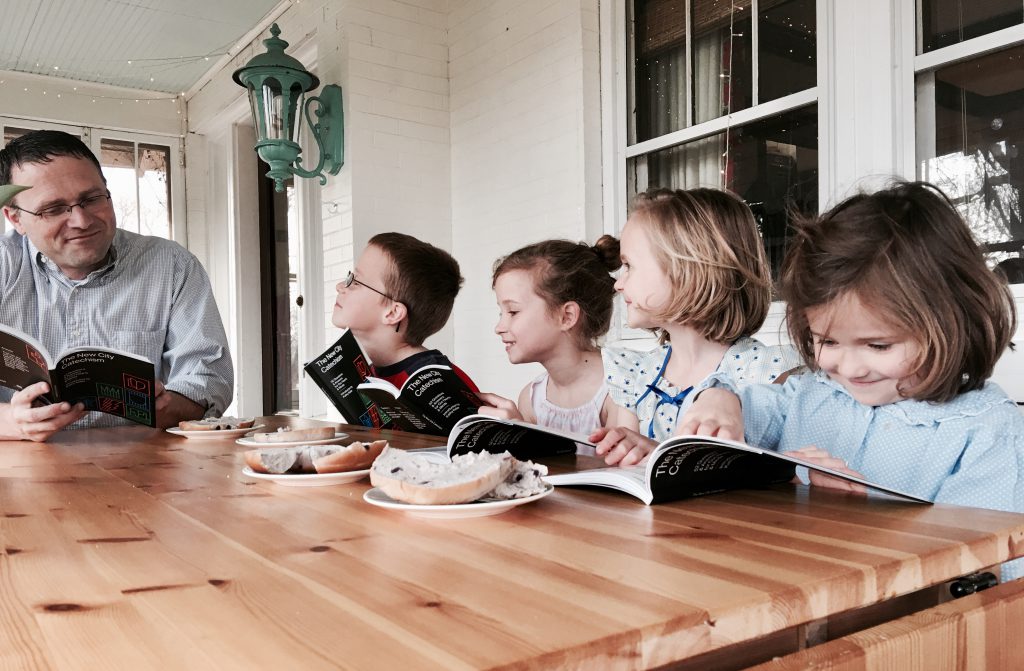Now available: The New City Catechism Curriculum, 52 lessons designed to help children ages 8–11 learn the core doctrines of the Christian faith in a Sunday school, classroom, or homeschool setting. Order yours today!
Dan and Lucy Olson live in urban Minneapolis. They have been using The New City Catechism (NCC) with their four children—Charlie (8), Elisabeth (8), Mary (7) and Annie (4)—for a couple of years. I corresponded with the Olsons to talk about why and how they use the NCC. (Since Dan is director of donor ministries for TGC, he had early access to Songs from The New City Catechism.)
Why did you start catechizing your kids?
As parents of four young children, we had used mostly story Bibles and Scripture memory for our family devotions. But our oldest two kids—boy-girl twins—are now in third grade. They have started asking deeper theological questions, and we wanted a process to engage them with biblical truths in a systematic way.
We know in this world our children will face many troubles. Athletes begin training months before competition. Soldiers train for years in preparation for potential conflict. We want our children to be ready with a reservoir of deep theology when the day of trouble comes.
Why did you choose The New City Catechism?
The vocabulary and brevity of the NCC make it accessible for children without compromising theological depth. We also love the format. Not only is it more concise, but it’s particularly neat that the shorter children’s answers are embedded in the longer adult answers. We’re memorizing the short answers with our kids, but it’s helpful having the longer answers right there to inform the discussion.
The option to memorize through song has made learning the large body of questions and answers not only practical but also fun. Our children don’t dread the daily catechism; it’s a time of merry singing!
What does a catechizing session look like for your family?
Most mornings, we do a 10-minute session as our kids are finishing breakfast. A wise friend told us that when forming a new habit, attach it to something you already enjoy. Each morning we sing one or two review catechism songs and introduce one new question and answer. We explain and discuss the meaning of the newly introduced question. This has worked for us since the kids are already gathered at the table, and their minds are freshest first thing in the morning. We keep the sessions short, but in that little bit of daily time over the past year even our 4-year-old has memorized about half of The New City Catechism through song.
I (Dan) also do a one-on-one breakfast with each of our kids once a month, and we usually take 10 to 15 minutes to discuss one or two of the catechism questions.
Does the catechism come up in discussion at other times?
It comes up all the time. As a family who upholds traditional biblical values, we are in the vast minority in our urban Minneapolis neighborhood. So we talk quite regularly with our kids about why our choices are so different from those of our dear neighbors. It feels so natural to ground these conversations in language that the children have already memorized from the catechism.
For example, last fall we began carpooling to a weekly orchestra practice with a new friend from our neighborhood. We were uncertain when we first met Taylor (not her real name) if she was a girl or a boy. The first night she rode with us, she hopped in the car and cheerfully announced that she is bisexual, and that many people think she is a boy, although she’s actually a girl. Of course this was the first thing our son Charlie (age 8) wanted to talk about when we got home later that night: “What does it mean to be ‘bi’ and why does Taylor look like a boy?” I (Lucy) began by asking him if he remembered the answer to the question, “How and why did God create us?”
“God created us male and female, in his own image, to glorify him” was right on the tip of his tongue. With this framework already established, it wasn’t difficult for Charlie to understand that not all our friends believe what God tells us in his Word is true. This new friend believes she can change her identity from female to male because she doesn’t believe God made her female to glorify him.
Do you think your kids understand what they’re memorizing?
Some of the catechism they grasp right away. For example, “God is the creator of everyone and everything.” Some they memorize and will understand later as it comes to bear on our life. We love the metaphor of catechism and sound doctrine being like firewood. We lay the logs in place, but God has to bring the fire. Our job is to faithfully love and train our kids.
As a parent, do you worry about filling your kids heads without reaching their hearts?
We expect toddlers to memorize vocabulary before they experience meaning. We aren’t worried that learning words will make them parrots. We don’t worry that if our little children memorize poetry, they won’t be able to write their own. We believe the catechism gives all of us a shared vocabulary and framework to interpret and discuss the experiences that follow throughout our lives.
We can’t make all the connections for our children, but the catechism framework has helped us to spread a banquet of truth before them in the morning and to spark spiritual conversations that feel natural throughout the day. We pray these spiritual conversation grounded in biblical truth will inform the experiences that our children are having—and that the Holy Spirit will captivate their hearts.
Related:
